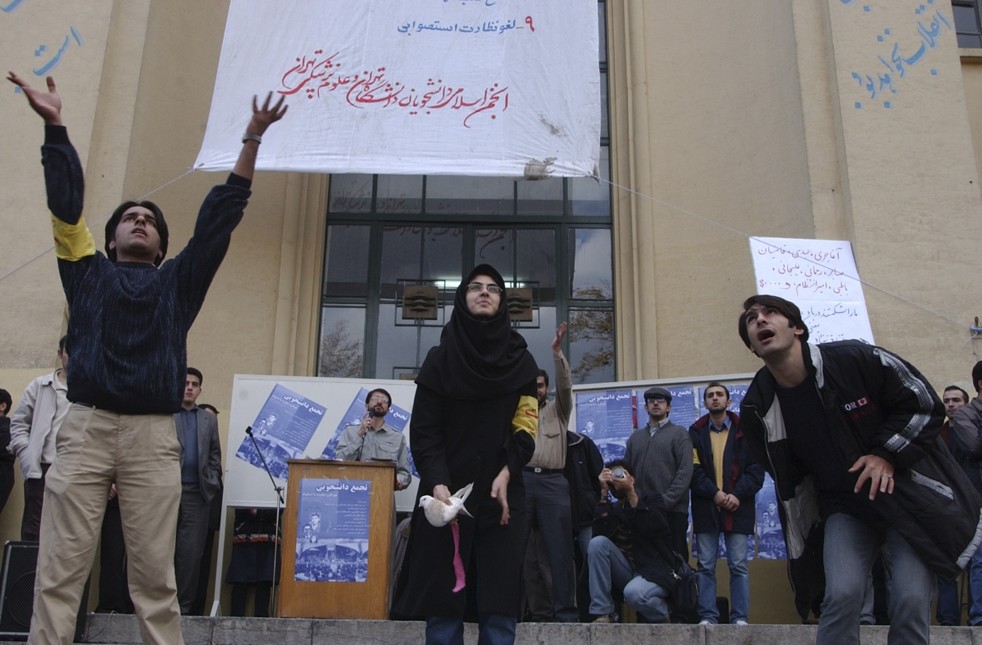UPDATES
The world’s eyes unable to focus on Iran
July 13, 2011 | Daniel Meyerowitz-Katz

This blog has been closely following the inexplicable failure of the Western World to apply proper scrutiny to Iran, as well as the internal strife that is currently gripping the Islamic Republic. A very poignant editorial in today’s Jerusalem Post argues that the UN, too, has failed to apply adequate attention to the Ayatollah regime. The Post points-out the incredible amount of attention that the Palestinian Authority’s upcoming statehood bid in the UN is receiving, juxtaposing this with the relatively negligible consideration given to Iran.
Former US ambassador to the UN, John Bolton, noted this disturbing fact in a meeting Tuesday with The Jerusalem Post editorial staff.
“It’s been interesting to me in the couple days I’ve been here to note the fascination people have with the question of the Palestinians seeking some kind of resolution at the United Nations on the subject of statehood,” Bolton said.
“In fact, I’ve had a lot of meetings where officials, and knowledgeable people, start off by saying we have not forgotten about the threat posed by the Iranian nuclear weapons program. And then they say, ‘But’… and the rest of the discussion is about the Palestinians at the UN,” he added. [emphasis added]
As the editorial goes on to note, Iran is practically flaunting its nuclear program in the face of the international community as all eyes are on a statehood bid that, in all likelihood, will have little or no effect aside from a diplomatic circus
The Iranian regime – stopping short of declaring outright its intention to produce an atomic bomb – is not even trying to hide the progress being made in its nuclear enrichment program.
…Preoccupation with Palestinian statehood seems to be diverting attention away from a far graver threat to regional stability: Iran’s seemingly unstoppable march toward nuclear capability.
This news come just days after reports of Iran ramping-up executions and imposing increasingly draconian restrictions on its civil institutions. Meanwhile, a court in the Netherlands has recently found that Dutch UN peacekeepers were responsible for failing to prevent Bosnian deaths during the genocide in Srebrenica. As Manfred Gerstenfeld has noted in Ynet, this was not an isolated case – the UN has failed to prevent many heinous crimes against humanity over the last half-century.
Regarding the failure of the UN in the 1994 Rwanda genocide, none of its employees or any person associated with it had to appear before a court, let alone sit in jail. A UN report published in April 2000 examined the “circumstances surrounding the failure of the international community to prevent the systematic slaughter of some 800,000 people in Rwanda in 1994.” The late Richard C. Holbrooke, who was the US permanent representative at the UN, noted: “The report made clear that in Rwanda – as in Bosnia and Somalia – we failed.”
In fact, this is merely the tip of the iceberg. ABC’s Four Corners program in the last three weeks has exposed another two of these cases – last week it exposed the UN’s decision to abandon the Tamils in Sri Lanka and the horrible war crimes that ensued, while the week before it covered some of the horrors carried out in Cambodia 25 years ago without intervention by the UN – a crime for which the perpetrators are only now being brought to justice.
Gerstenfeld gives some harrowing reports of exactly how the Dutch military treated the situation in Srebrenica. As he points out, the Dutch behaviour was far worse than the behaviour of the IDF in any of the Israeli military operations that, ironically, received a far more severe level of criticism from the UN and the International community than any of these far worse atrocities.
To put Dutch military behavior into an even more negative light, the commander of the land forces had decided that the Dutch soldiers who had left the population of Srebrenica to its tragic fate were entitled to a party after their successful flight to Zagreb. Dutch historian Henry Beunders would later write: “While the Bosnians were standing up to their knees in blood, the Dutch soldiers in Zagreb were standing up to their ankles in beer, being applauded by Crown Prince Willem Alexander, (Prime Minister) Kok and Voorhoeve.”
Many Israeli politicians and the Israeli media give little attention to events in Europe. Yet analyzing them can contribute greatly to Israel’s public diplomacy. Understanding how other countries as well as the UN function during emergencies helps to put frequently exaggerated external and internal condemnations of Israel’s performance into perspective, even if lesser criticism is in place.
Two examples of how such reactions to Israeli military responses are greatly overblown concern the condemnations of Israel’s actions against the violent provocations by the participants in the first Gaza flotilla and the Syrian government sponsored border transgressions on “Nakba day.
The simple lesson from this is that the most despotic and brutal tyrants of the world have successfuly diverted the UN’s gaze towards the world’s sole Jewish state. Meanwhile, the UN, which was established in the wake of the Holocaust, has turned its back on the very atrocities that it was formed to prevent. While the tragedy that has befallen Rwandans, Bosnians, Cambodians, Somalis and Tamils can never be undone, the best way that we can honour their memory is to ensure that the Iranians will not be able to trigger similar events in the future.
Tags: Holocaust/ War Crimes





